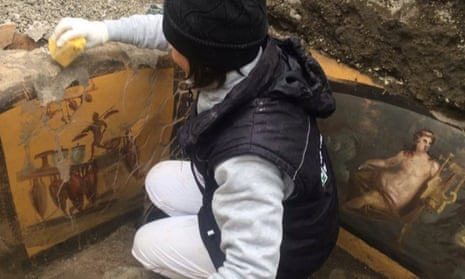A well-preserved frescoed “fast food” counter is among the latest discoveries unearthed by archaeologists in the ancient Roman city of Pompeii.
The 150 or so thermopolia, or snack bars, dotted across the city were mostly used by the poorer residents, who rarely had cooking facilities in their home, to grab a snack or drink. Typical menus included coarse bread with salty fish, baked cheese, lentils and spicy wine.
An image of the 2,000-year old relic, found in Regio V, a 21.8-hectare (54-acre) site to the north of the archaeological park, was shared on Instagram by Massimo Ossana, the site’s outgoing superintendent.
“A thermopolium has been brought back to light, with its beautiful frescoed counter,” he wrote.
This article includes content provided by Instagram. We ask for your permission before anything is loaded, as they may be using cookies and other technologies. To view this content, click 'Allow and continue'.
Ossana’s five-year mandate ended in early January but he is expected to be rehired. He is among 10 candidates, including Paul Roberts, the Sackler keeper of antiquities at the Ashmolean museum at Oxford University, who will be interviewed by the culture minister, Alberto Bonisoli, in early April. The new superintendent is expected to be in place by Easter.
Dozens of other thermopolia have been found throughout the entire archaeological park. Regio V, which is not yet open to the public, is the most intensive dig at the site since the 1960s.
Excavations so far have yielded dozens of discoveries. In February, archaeologists found a stunningly preserved fresco depicting the mythological hunter Narcissus enraptured by his own reflection in a pool of water. Human remains have also been found, including the skeletons of two women and three children found huddled together in a villa. The remains of a harnessed horse and saddle were also found in late December.
Pompeii was destroyed in AD79 by an eruption that killed more than 2,000 people. The ruins were discovered in the 16th century and the first excavations began in 1748. Pompeii is one of the most visited archaeological sites in the world.
